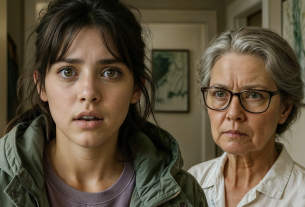“Here. She… looked everything over again.”
Kirill’s voice was muffled, guilty, like that of a schoolboy bringing home a report card with a failing grade. He didn’t enter the room—he seeped into it, trying to make as little noise as possible, as if hoping his presence would go unnoticed. In his hand, he held a neatly folded sheet of notebook paper, written in his mother’s familiar, elegant but oppressive handwriting.
Dasha didn’t immediately look up. She was completely absorbed in her world, spread out across the large dining table. For a month now, this table had been her headquarters. On it reigned a perfect order, one that only she could understand: stacks of samples of expensive designer paper for invitations, a fan of menu options, a large printed seating chart that looked more like a military operation plan. Just as she was making a correction with her fine mechanical pencil to the placement of the colleagues’ table, Kirill spoke his phrase.
She froze. The pencil stopped a millimeter above the paper. For several seconds she remained motionless, not turning around, and the pause was more terrifying than any scream. Then she slowly, with mechanical precision, placed the pencil exactly across the center of her notebook, aligning it neatly with the edges. Only then did she raise her eyes to him.
Her gaze was calm. Frighteningly calm. No trace of irritation, no flicker of anger. Just cold, detached attention—like a surgeon studying an X-ray. She didn’t reach out for the paper. She just looked at him, making Kirill feel absurd, an intruder in her perfectly structured space.
“This is the third one,” she said. Her voice was even, without a single trembling note, like a news anchor reading the weather. “The third list in two weeks, Kirill. What now? Who else have we forgotten to honor with an invitation to our wedding?”
Awkwardly, he stepped toward the table and set the sheet down at the very edge, afraid to disturb her sacred order.
“Dash, you have to understand… She says Aunt Galya will be offended if we don’t invite her cousin. They were very close when they were young. And also a couple of colleagues from her old job. They really helped her a lot back then.”
He spoke quickly, stumbling, like someone trying to speed through a dangerous stretch of road. Dasha didn’t even glance at the list. Her eyes stayed fixed on his face. She tilted her head slightly, and in that small gesture was so much icy curiosity that he felt a shiver run down his back.
“Aunt Galya. The one we saw once in our lives, five years ago at your uncle’s anniversary? The one who mistook me for a waitress and asked me to bring her another glass of champagne?” She wasn’t asking, she was stating facts. Each fact was a small shard of glass she pressed into his palm. “And this woman’s cousin… What does she have to do with us? With our lives? With our day?”
“Well, she is family…” he mumbled, feeling his arguments crumble to dust under her heavy, calm gaze.
“Family of your aunt. Not yours. And certainly not mine.” Dasha rose from her chair. She was not tall, but in that moment it felt as if she towered over him. She walked around the table, stopped in front of him, and folded her arms. “Kirill. Explain one simple thing to me. We spent six months working on these lists. We checked every single person. We argued, fought, compromised. We agreed this would be our celebration. For us, and the people closest to us. Those who know us both. Those who are happy for us. When exactly did your mother become the main organizer and director of our wedding?”
Her voice didn’t rise. It grew quieter, denser, heavier. She wasn’t attacking; she was dissecting the situation, and Kirill felt like the frog on a lab table, about to be cut open without anesthesia. He stayed silent, not knowing what to say. And in that silence, heavy and thick, he realized it was only the calm before the storm. The real tempest was just beginning.
Kirill’s silence was louder than any words. He just stood there, shoulders slumped, staring at his shoes as if they were the most fascinating thing in the world. That silent, submissive confession of helplessness was the last straw for Dasha. The control she had clung to cracked, like thin ice under too much weight.
She didn’t scream. Her voice dropped lower, gaining a dangerous, growling edge. She stepped closer, and Kirill instinctively backed away until his back hit the doorframe.
“Listen to me very carefully,” she began, enunciating each word as if hammering nails. “I’m not asking why your mother is doing this. I don’t care about her motives, her resentments, or her old colleagues who once helped her. I’m asking you. You, Kirill. Why do you bring this to me?”
Her movements grew sharper, predatory. She grabbed the folder with the budget printouts, each item checked down to the last ruble, and tossed it carelessly onto the table in front of him. The papers fanned out across the polished surface.
“See this? This isn’t just paper. This is our budget. Money we saved for almost two years. Yours and mine. Every new name on this stupid list isn’t just a line. It’s a place at the restaurant. It’s food, alcohol, service. It’s five, six, seven thousand rubles out of our pocket for a person I don’t know and don’t want to know! Someone who couldn’t care less about us, but who wants to come, eat at our expense, and then gossip about whether the main course was good enough.”
She leaned over the table, hands braced on either side of the folder, her face only thirty centimeters from his. He saw how dark her eyes had grown. No more cold calmness—only fire, black and furious.
“Your mother isn’t helping us, Kirill. She isn’t caring. She’s asserting herself. She’s turning our day into her personal show, her vanity fair, a stage for her to brag to everyone she wants. And you—you’re her obedient errand boy. You don’t even try to explain anything to her. You just bring me her ultimatums with your tail between your legs, hoping I’ll swallow them somehow.”
She straightened, her voice rising now, filling the room, vibrating with restrained fury, with contempt she no longer bothered to hide.
“If your mother is paying for our wedding, then she can invite whoever she wants, as many as she wants. But if not… then she needs to stay the hell out of it! Enough!”
The last word cracked like a gunshot. She turned away sharply, ending the conversation. Kirill, stunned, finally managed to say something—the worst possible thing he could have chosen.
“Dash… you can’t talk like that. You have to show some respect for elders. She’s my mother…”
He fell silent. The change in her expression was so sudden it unnerved him. The fire in her eyes went out instantly, like someone flipping a switch. In its place came cold. Not anger, not hurt—just pure, clear, winter-air clarity. She looked at him the way one looks at a stranger on the street. And in that look, Kirill saw the end.
His words weren’t the spark that blew up the barrel of gunpowder. They were the switch that cut all power. Her fury drained instantly, leaving behind a ringing emptiness, a terrible stillness. It wasn’t forgiveness, it wasn’t surrender. It was a decision, made deep down, beyond emotions or doubts.
She no longer saw him as her fiancé, the man she’d wanted to build a life with. She saw him as a failed experiment: regrettable, but irrelevant. He was no longer part of her plans. He was simply a man standing in her room. A stranger. Pathetically predictable in his weakness.
Without a word, she turned back to the table. Her movements lost their sharpness, becoming calm and deliberate, ritual-like. The room, thick with tension a moment ago, now felt spacious, quiet. Kirill watched her back, frozen, knowing something irreversible was about to happen, but powerless to stop it.
She stopped at the seating charts. Looked at the invitations, the budget, all the artifacts of a future that no longer existed. Then her gaze fell on the folded notebook page he had brought—a foreign object, a virus that had killed the whole system from within.
She raised her left hand. The light glinted off the smooth band of the engagement ring, with its small but perfect diamond. He had chosen it himself, proud of his taste, remembering how her fingers had trembled when he slipped it on in that rooftop restaurant. Now her fingers were firm, steady. She pinched the ring between her right thumb and forefinger and pulled it off. It slid off easily, without resistance.
Holding it delicately, as if it were some strange insect, she hovered it over the paper. Paused, giving Kirill time to fully comprehend. Then she let go. The ring fell with a soft, dry click. That tiny sound was louder than a gunshot in the suffocating silence. The gold circle with its diamond spark rested squarely in the middle of his mother’s handwriting.
With one finger, she nudged the paper and ring across the table toward him. It slid smoothly and stopped before him.
“Here,” her voice was flat, emotionless, like a secretary handing over documents. “Give this to your mother. It’s in place of an invitation. Let her marry you, since she knows better how to run your life.”
She paused, letting the words saturate the air, the walls, his consciousness.
“The wedding is off.”
Then she turned. But she didn’t pack her things, didn’t slam the door. She simply walked into the kitchen, calm and measured. Kirill heard the cupboard open, the clink of a glass, the flow of water from the tap. That ordinary sound, against the backdrop of their shattered world, was the most horrifying sound he had ever heard. She wasn’t staging a tragedy. She had simply erased him from her life and gone to drink water. And he was left alone in the room, staring at the ring lying on the stupid list like a gravestone over their future.
For the first few minutes, Kirill didn’t move. He stood rooted, staring at the glittering ring. The sound of running water, the glass clinking on the counter, seemed deafening. His mind refused to process. In the vacuum of panic, he did the only thing he knew how to do in a crisis—he pulled out his phone and dialed the first number on speed dial.
“Mom, come. It’s really bad.”
Valentina Petrovna arrived forty minutes later. She didn’t ring; she used her own key, entering not as a guest but as the mistress of the house come to restore order. Her face radiated righteous indignation. She saw her son, still standing dazed in the living room, and without a greeting, demanded in a low, commanding voice:
“Where is she? What does that… woman think she’s doing?”
“In the kitchen,” Kirill answered quietly, eyes still fixed on the table.
His mother marched toward the kitchen. Dasha sat calmly at the table, sipping water. She didn’t rise, didn’t bristle. She looked up at the woman with no fear, no hatred. Only boundless, cold weariness.
“What have you done to my son?” Valentina Petrovna demanded, stopping in the doorway. She was ready to launch into more, but Dasha cut her off.
“To your son? Absolutely nothing, Valentina Petrovna. I just stopped trying to turn him into my husband.”
Dasha’s voice was calm, almost friendly, which made her words sound all the more brutal. She set down her glass and folded her hands.
“You’re probably thinking it’s because of the list. Don’t worry—it’s not about that. Or your cousin. This ring your son is about to bring you—” she spoke as though Kirill weren’t even in the next room, as if he already belonged to her past, “—it isn’t a bride’s tantrum. It’s a diagnosis. Of our failed family.”
She shifted her gaze toward the invisible Kirill, her voice even quieter, sharper.
“I was marrying him. Kirill. I wanted to build a life with him. But it turned out impossible. Because with him always comes you. Not as a mother-in-law, or a grandmother to my children. But as the majority shareholder in our marriage, holding the deciding vote. And your son—he’s not my partner. He’s just the obedient employee too afraid to defy you.”
Valentina opened her mouth to retort, but no words came. Dasha wasn’t ranting; she was explaining the diagnosis of an incurable condition.
“You see, I don’t want to live a life constantly looking back and asking your permission. Can we vacation here? Can we buy this furniture? Can we name our child the name we like, not the one you approve? I don’t want our decisions—my and my husband’s decisions—to pass through your censorship. And with Kirill, that will never change. Ever.”
She glanced again toward the living room.
“And him… he would stand between us forever. Not as a wall, not as a protector, not as a mediator. Just as a postman, delivering someone else’s demands, lowering his eyes. I don’t want that husband. I’m sorry. But I respect myself more.”
She stood. Took her bag. No rush, just calm finality. She walked toward the door, pausing briefly beside Valentina.
“It’s not about your love for your son,” she whispered. “It’s that your love leaves no room for anyone else. Goodbye.”
She passed her, passed Kirill—still frozen—and left. The lock clicked softly. Silence fell again, but it was no longer the same silence. It was heavy, sticky, filled with unspoken blame. Mother and son were left alone. Valentina slowly turned to Kirill. And for the first time, she saw in his eyes not adoration, not obedience, but something else. Something empty and terrifying. And he looked at her—at the source of all his excuses—and knew Dasha had been right.
The wedding would not happen.
And perhaps life itself would not, either.



